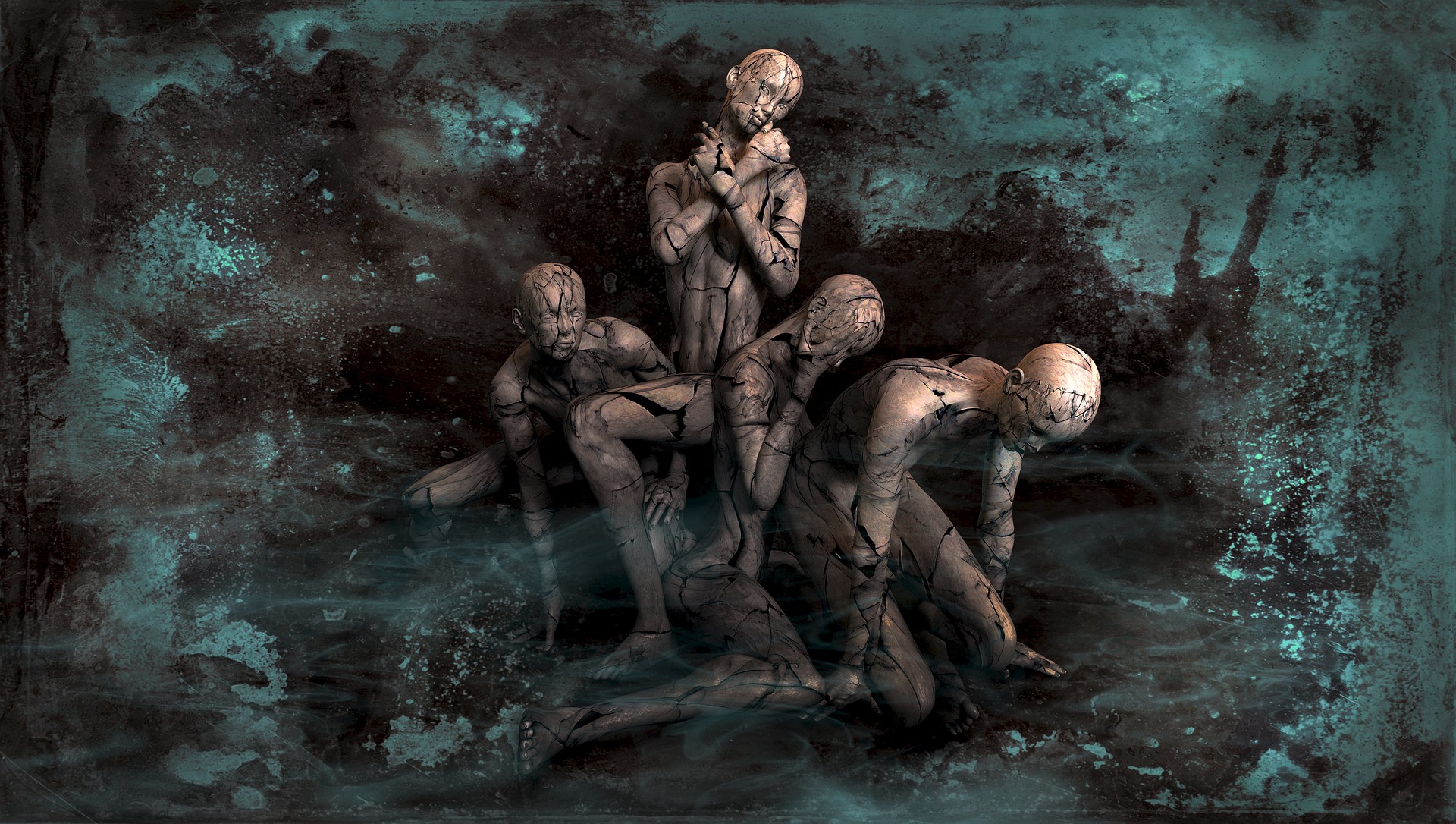Plague Mind
Content warning: contains mentions of mental trauma and suicide
The plague affected us all, but we each lived a different experience, depending on who we lost and what we had to do to survive. Some people survived, but now they can't thrive, because the plague has settled on their minds.— Traks, Daffodil order cleric
Having plague mind feels like there's an ambush predator after you. I never know what will trigger it: a smell, a voice, a place. And what's worse, what triggers plague mind one day doesn't trigger it the next. So I just ended up avoiding everything. Until Traks started helping me out.— Skrarkit, a ratfolk with plague mind
Many of those who survived the plague had to live either through the disease themselves or watched their loved ones go through it. During the plague years, people lived in a permanent state of doubt and fear. This, together with the constant state of mourning for lost ones caused deep mental injuries in survivors. These people had to keep on going while their loved ones and their lives as they knew them disappeared right before their eyes, year after year.
The main symptom plague minded people experience is the partial or full re-living of experiences from the plague years, such as unwanted and recurrent memories, sensory or mental flashbacks, or nightmares of plague events.
This typically leads to a host of associated behaviours and conditions, including:
- Changes to the affectiveness of a person, typically avoidance or shunning of emotions
- Emotionally unstable, will often suffer from anxiety, concentration, or emotional outbursts
- Memory loss, particularly around events during the plague
So far, there is no one way of treating plague minded people. The general advice is patience, generating new memories and experiences so that they stop associating common daily things with the plague, and to talk with them about the plague to identify which issues cause them the greatest suffering.
Some plague minded people do not wish to talk with people until they find someone who is also experiencing plague mind. This has led to some
daffodils creating groups of people for them to assemble and talk about what works for them in getting through life.
I can't decide if I want to forget, if I can't forget, or if I have already forgotten too much. And then, there's the nightmares about Emerald City...— Iomle Gadru, talking to her group
Plague mind has only started to be recognized as a disease, mostly by the surviving
daffodil order members. While the Daffodil Order is in disarray, their members do not need a leader to tell them that helping those who have survived the plague is the most important thing anyone can do now. As such, many members have started noticing common symptoms and reactions from a section of the population. Different sections of the surviving order started to give it a name, and whilst nowadays the accepted name seems to be "Plague Mind", the other names are still widely used.
Outside of the daffodil order, plague minded people often find incomprehension from other survivors, who cannot comprehend why do they distance themselves from those who they used to love. Few plague minded people talk about the issues they experience and prefer to simply retreat themselves from society to avoid reliving plague experiences, but ironically, they also do this to protect those they care for, as they fear what they may say or do while they relive experiences, whether partially or fully.
Related articles
Other Names
Survivors' trauma
Plague memory
Traumatic Mental-Plague Scars
Plague flashbacks
Invisible plague
Danger to life
Low, but some plague minded people have been known to commit suicide
Frequency
No one knows, but many daffodil members suspect it to be high, perhaps as high as 15% of the surviving Tiel population
D
ear Traks Moltenbash,
If this letter has reached you, along with four other letters, and two packages, please note I promised the carrier one month of flour to make bread, and two sheep, one male and one female. I hope you and the members you had left in Oloriar Steppe are managing. As usual, I write to you seeking your insight.
I am writing to you to discuss plague memory. I am not sure how do you call in in Oloriar Steppe, but I am sure you have encountered these individuals. They seem to retreat from society, avoiding things and people, their behaviour is erratic and sometimes even aggressive.
It is not easy to detect some of these people, as they may start avoiding people who remind them of specific plague events. However, it is precisely these people who can detect changes in behaviour or memory loss. I wonder if you have found a method of detecting said people in your community. I want to help as many people as we can, but I don't know how many people are in need of help.
One thing that I have noticed is that if they are told about other people in their community who are also experiencing these issues, they tend to be amenable to talking with them.
Any advice you can offer on this topic would be greatly appreciated. Now that the plague is gone, I fear this is the next great challenge the order is faced with. I fear we are as ill-prepared for it as we were for the plague. I pray every day that we do not fail again.
Most humbly,
Odni Lenwack.
Entry for Summer Camp 2019
Answering: "
Write about a mental illness in your world and how people respond to this."








It is interesting to see how much of your world is impacted by this plague. The image is pretty haunting and sets a good mood for the article. One thing I noticed is that you hint that people are afraid of what they might do to their family, but no real mention of violence besides the suicide. Are there instances where people have been hurt having one of those flashbacks? Or is this more of a fear they have despite it being something that has never actually happened? It seems that the Daffodil order is a clerical order? Does this only impact them and has nothing to do with what actual race they are? Curious if anyone has created theories why that would be? Just a few questions....I know most is private, so I tried to keep it in perspective of the article. Great Job!